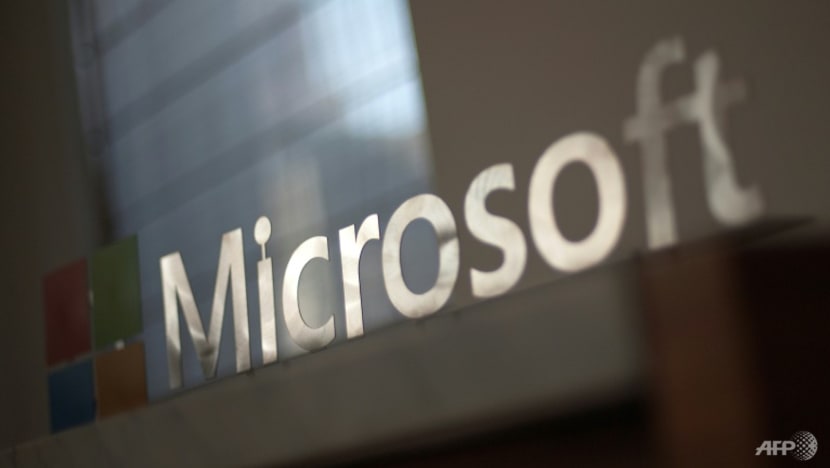Man admits conspiring to cheat Microsoft of S$192,900 worth of laptops in FBI-flagged case

File photo of a Microsoft logo. (Photo: AFP/Josh Edelson)
SINGAPORE: A Singaporean teenager conspired with an American man to commit fraud against Microsoft by making false warranty claims in order to obtain 56 laptops worth US$143,144 (S$192,900).
The accused, now 20, claimed that the laptops were sold off and that he used the proceeds to buy Bitcoin but "lost everything" after the price of Bitcoin plummeted in 2018.
The offender cannot be named as he was under 18 at the time of the offences and therefore protected under the Children and Young Persons Act.
He pleaded guilty in court on Tuesday (Feb 22) to one count of conspiring to cheat Microsoft, and three counts of acquiring property that were benefits from criminal conduct. Another seven charges will be considered in sentencing.
The court heard that the accused was 16 at the time of the offences in 2017. He became acquainted with an American citizen known as Justin David May, who was based in the United States at all times, through a private online forum. May's age was not indicated in court documents.
Members of the forum discussed methods to exploit the advance warranty programmes of entities selling electronic devices. Such schemes involved making fraudulent warranty claims to obtain replacement devices, while failing to return the supposedly faulty devices.
ACCUSED DISCOVERED A CHANCE TO CHEAT
Sometime between August 2017 and October 2017, the accused discovered that Microsoft Surface laptops were being sold online for US$800, which was less than half their retail price.
He also realised that the serial numbers of Microsoft Surface laptops with valid warranties could be purchased from certain online forum users for about US$25 each.
He shared this opportunity to exploit Microsoft's advance warranty programme and told May about it.
Together, they settled on a modus operandi: The accused would buy the serial numbers of the laptops with valid warranties online, and used them to make advance exchange warranty claims to Microsoft by claiming the devices were faulty.
In the warranty claims, he would indicate a US address provided by May for Microsoft to deliver the replacement devices to.
The accused would then give May the delivery tracking numbers to inform him of incoming shipments, and Microsoft would deliver the devices to the provided US addresses.
Once May received the laptops, he would consolidate and ship them to the accused's flat in Tampines.
As part of their agreement, May would keep one to two laptops for himself, for every five to eight laptops that he received.
On 56 occasions between August 2017 and October 2017, the accused submitted false advance exchange warranty claims to Microsoft for 56 laptops, while based in Singapore.
He submitted the claims either online or via telephone calls, using a fictitious name, email address and phone number. If he submitted the claims via phone calls, he used an application that made it seem as though he was based in the US.
Microsoft was cheated into delivering 56 laptops worth USS$143,144 to several addresses in the US as a result of the deception.
After receiving the laptops at his Tampines flat, the accused sold them on Carousell for between S$1,700 and S$2,500 each. He sold a total of 75 Microsoft Surface laptops on the platform, but investigations could not uncover how he obtained the other 19 laptops.
May was charged in the US in January 2018 for offences including mail fraud committed against Microsoft.
In May 2018, the Singapore Police Force's Commercial Affairs Department received information from the US Federal Bureau of Investigation (FBI) that the accused had allegedly conspired with May to commit the fraud against Microsoft.
The accused claimed he used the sale proceeds to buy Bitcoin, but lost everything after the price of Bitcoin plummeted in 2018. He made partial restitution of S$10,000 to Microsoft in August 2021.
The court called for a probation suitability report and adjourned sentencing to next month.
May was sentenced to seven years and eight months in prison and ordered to pay more than US$4 million in restitution after pleading guilty in two separate cases to 42 counts of mail fraud, 10 counts of money laundering, three counts of interstate transportation of goods obtained by fraud and two counts of tax evasion.
The US Department of Justice said May's convictions stemmed from separate schemes he perpetrated in order to defraud Cisco Systems, Microsoft, Lenovo Group and APC by Schneider Electric out of computer hardware.














